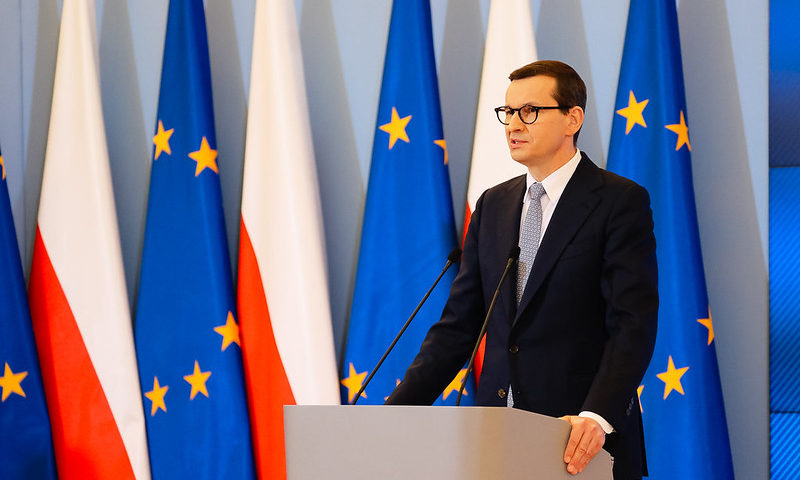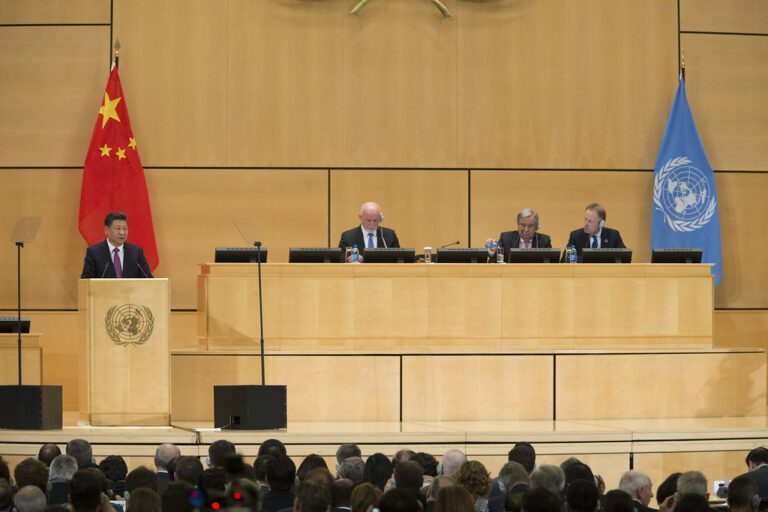How Russian Disinformation Troubles Sino-Polish Ties

This article is part of a series of articles authored by young, aspiring China scholars under the Future CHOICE initiative.
Ties between Warsaw and Beijing are going through a rocky period, impacted by the Russian invasion of Ukraine. China’s unwillingness to curb the spread of Russian disinformation about Poland within China runs contrary to Beijing’s quest of “telling China’s story well,” underling its failure to take Poland’s fundamental security concerns seriously.
Back in 2021, Poland saw an unprecedented migration wave on its eastern border with Belarus, dubbed an act of hybrid warfare orchestrated by Lukashenka and Putin. The refugee crisis helped bolster the country’s radical currents (predominantly by the instrumentalization of the issue by certain politicians) and accelerate political polarisation, developments that were definitely warmly welcomed in Moscow.
Whether one looks at the autumn events as a distant prelude to the Russian aggression against Ukraine, or merely another page from Putin’s imperial playbook, they also highlighted a significant development in the Polish political discourse. Many public figures, including Poland’s former ambassador to Russia, Katarzyna Pełczyńska-Nałęcz, the head of the third most influential political force Polska 2050, Szymon Hołownia, and prominent leftist leader, Adrian Zandberg, believed that the solution to the refugee crisis might come – apart from the traditional regional players and the EU – from China.
China to the Rescue?
The rationale behind this line of reasoning was China’s economic clout, manifesting itself predominantly through the Belt and Road Initiative. The idea of a closure of the intermodal terminal in Małaszewicze, located just nine kilometers from the Polish-Belarussian border, dubbed the “Chinese gateway to Europe,” circulated in the Polish media discourse and was meant to draw the Chinese attention to Poland’s eastern border and force China to pressure Belarus on Warsaw’s behalf.
Ultimately, apart from a few secluded remarks by the Chinese Foreign Ministry stressing the typical pledge to “properly handle the issue through dialogue and consultation following the humanitarian principle,” more tangible results have not materialized – partly because of the convergent strategic goals of China and Russia, partly because of mutually beneficial economic relationship. It seems that using the economic leverage to put pressure on Belarus would run contrary to the high-level partnership between Moscow and Beijing, given the extraordinarily close Russo-Belarussian ties.
Looking back, the refugee crisis was probably the first and perhaps also the last regional contingency where prominent Polish public figures believed Chinese involvement could help solve the challenges mounting before Poland. The Russian invasion and China’s reaction seem to have shattered these expectations.
Divergence on Ukraine
China’s diplomatic balancing act after the Russian aggression – with significant friendly gestures towards Moscow – left a bitter impression in Poland. This was perhaps best voiced by the Polish Prime Minister Mateusz Morawiecki who, in the opinion article in Politico, warned the EU and the US against “China in tandem with Russia” and the potential desire of the Beijing government to “become more active in taking over global assets” amid the Russian aggression. While the statement can be interpreted as, first and foremost, an expression of distrust towards Russia and the desire to support the China policy of its chief ally, the US, it nevertheless shows that Polish leaders have been closely following China’s stance on the war and its relationship with Russia.
The tensions over Ukraine have manifested in official contacts as well. The delegation of China’s Foreign Ministry that toured the region in April, led by a special envoy to the CEE, Huo Yuzhen, met only with the members of the Polish parliament, not the Polish Foreign Ministry. Considering the fact that the visit was meant to “clarify misunderstandings” it ultimately proved to be a failure. The recent contacts such as the foreign ministers’ meeting or the call between President Duda and Xi Jinping also attest to the troubled ties, with Poland putting the Ukraine issue to the forefront, while China trying to sideline it altogether.
The developments described above paint a rather bleak picture of Sino-Polish relations. First and foremost, there is a lack of political direction. Official readouts from high-level meetings are full of lofty statements about strengthening economic ties, boosting investment, and facilitating infrastructure projects. As the current situation in the whole region shows, expectations about these developments were hardly met. This is also visible in the statistics – while on paper Poland was the 2020’s second top destination for the Chinese FDI, it was mainly due to the acquisition of the Goodman Group’s Eastern Europe logistics portfolio with the transaction totaling roughly €1 billion. In 2021, cumulated Chinese investment in the whole of Eastern Europe amounted to just €385 million, while in comparison, EU-27 countries and the UK received a grand total of €10.6 billion in Chinese investment.
Unmet economic expectations and China’s balancing act between the West and Russia is precisely what drives the Polish and other regional governments away from closer cooperation with Beijing. In a recent article in Polish media, the Chinese Ambassador to Poland, Sun Lijiang, emphasizes blurry future benefits, entirely omitting the Russia and Ukraine issue. The belief that “strengthening friendly Sino-Polish cooperation is in line with the opinion of Polish society and Polish local governments” is somewhat dubious – which also has its reflection in the opinion polls.
Russian Disinformation Running Rampant
Besides the official communications and diplomatic signaling, ties with China were also impacted by the prominence of Russian disinformation in the Chinese media discourse. For instance, fake news about the Polish military occupation of Ukraine (publicized by a journalist from partially state-owned Phoenix TV) claimed that the Polish armed forces would move into the Ukrainian territory to “seize two regions” and “defend” Western Ukraine. An article by media giant Xinhua spread disinformation about the Polish involvement in the US-led bio lab military program, a variation of one of the primary examples of Russian fake news about the Western involvement in the Ukrainian conflict. An Oriental Daily article claimed that Poland’s “imperial ambitions” will lead to its taking advantage of the situation to seize the Ukrainian territory, “make the border disappear” and “grant special status to the Poles.” These fake news feed on the Polish-Ukrainian historical grudges and are trying to instill fear of revisionism.
The disinformation reached a level where the Polish authorities felt the need to respond as well. In reaction, the Polish Embassy in Beijing issued a notice warning Chinese netizens against Russian propaganda campaigns, while the Polish Ministry of Defence cautioned against hostile influence operations. While media outlets such as Guancha and The Paper pointed out the dubiousness of the reports, the fake news nevertheless showed that the Russian disinformation campaign bore fruits on Chinese soil. Allowing this kind of disinformation to exist in the Chinese (social) media discourse seems quite counterproductive to the efforts of the Chinese diplomatic service, especially given the degree of control Chinese authorities have over the internet in China.
More importantly, the spread of disinformation runs contrary to Xi Jinping’s quest of “telling China’s story well,” which has taken several dimensions in the case of Poland. Apart from the direct activities of Chinese media, most prominently China Radio International Poland, Chinese diplomats have become increasingly active in major Polish media outlets, trying to appeal to local audiences. However, ultimately, these efforts ring hollow when Russian disinformation on Poland is allowed to spread in China’s public space. While negative media discourse may not appear significant within the comprehensive picture of Sino-Polish relations, it only feeds into the mutual distrust, with a spillover effect reaching intellectual but also political circles.
Way Forward
But it does not have to be that way for the government in Beijing. As the contingency on the Polish-Belarussian border has shown, China is considered an important player and potential partner by at least some political and media circles in Poland. By cracking down on the spread of Russian fake news and condemning the aggression against Poland’s neighbor, China could easily score points not only in Warsaw but also in the other CEE capitals.
Would it be worth it for Beijing, though? Probably not – sacrificing ties with Moscow is too hefty a price to pay, let alone doing it for Poland’s sake. In this vein, the trend of the growing divergence in Sino-Polish relations will most probably continue. After all, security is non-negotiable – be it military or economic – and unless this concern is taken seriously, the future of genuine comprehensive cooperation between China and Poland is under serious doubt. Ultimately, the Russian disinformation running rampant in the Chinese public discourse is merely a symptom of a lack of understanding of Poland and other CEE countries’ concerns about its aggressive neighbor.
Written by
Patryk Szczotka
p_szczotkaPatryk Szczotka is an Analyst at the Warsaw Institute and an MSc student in the "China and International Relations" double degree program at Aalborg University and the University of International Relations in Beijing. His research interests include political and economic relations between the CEE countries and the PRC.


